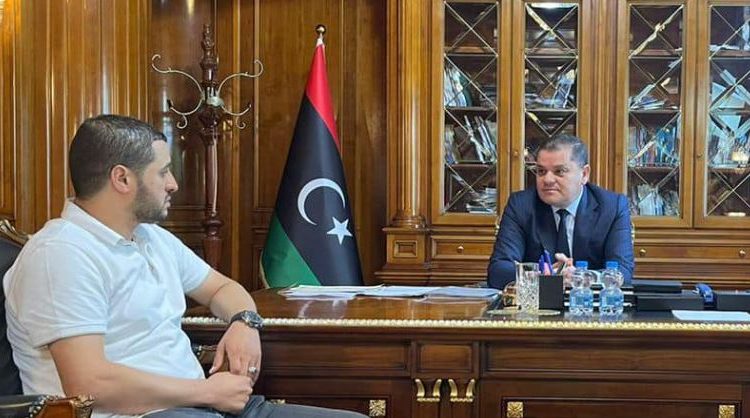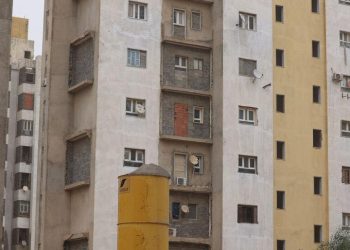The Tripoli-based Libyan Prime Minister, Abd Alhamid Aldabaiba, yesterday suspended the chairman of the General Electricity Company of Libya (GECOL), Wiam Al-Abdali, and his board of directors.
GECOL is to be run by an interim general manager until GECOL’s next General Assembly. Al-Abdali and his board are to be referred for administrative investigation by an investigation committee.
Aldabaiba appointed the head of the Tripoli Public Services Company, Mohamed Ismail, as the new temporary General Manager, and appointed himself as the new chairman of the GECOL board of directors.
In his decree (288/2022), Aldabaiba also formed an investigation committee headed by the Minister of Planning, the Minister of Local Government, a member of the Legal Affairs and Complaints Department in the Cabinet and a member of GECOL’s General Assembly to be named by the investigation committee’s head.
Aldabaiba set three tasks for the investigation committee regarding the causes of the continuation of power cuts, namely:
1- Investigate GECOL’s delay in introducing some new power stations to the national network according to the previously specified and approved dates by the board of directors.
2- Investigate the use of money allocated to GECOL during 2021 to solve the electricity crisis in the absence of corresponding results.
3- Investigate non-completion of contractual procedures for periodic and preventive maintenance projects and new projects.
Loss of 230 million cubic metres of gas supplies led to the loss of over 1,000 MW of electricity
The government’s social media information site blamed the power cuts of over 10 hours on the lack of gas supplies to power stations because of the oil production/export embargo. It stated that these have led to the loss of 230 million cubic metres of gas supplies leading to the loss of over 1,000 MW of power production.
Analysis
Aldabaiba taking major risk?
By taking personal control of GECOL Aldabaiba is taking a major political risk and putting his neck on the line. No interim Libyan Prime Minister, east or west of Libya, has been able to solve Libya’s electricity supply crisis since the 2011 revolution that ended the Qaddafi regime.
The decision comes after promises made by Aldabaiba and GECOL to solve the electricity problem almost completely at the end of last year. There will be no lengthy power cuts this summer, Libyans were told by Aldabaiba.
However, it is because part of the problems of Libya’s electricity generation supply are a legacy of the old regime that no prime minister has been able to solve the problem over the last 11 years.
However, Aldabaiba either did not understand the root problems of Libya’s electricity crisis or he ignored them. Taking personal responsibility by Aldabaiba sends the message that the electricity crisis is solvable. It implies that the solutions are probably administrative and can be fixed short term.
This has raised questions amongst the Libyan public. On the one hand they have been told that electricity generation takes years to fix. They are told that Libya’s insecurity prevents foreign technicians from entering Libya to fix the problems.
Over the last few weeks, however, Libyans have been told that the latest lengthy power cuts are a direct result of a shortage of gas supplies due to the eastern (Khalifa Hafter/Ageela Saleh/Fathi Bashagha) imposed oil production / export blockade.
This has raised a question amongst Libyans. If the power cuts are a result of fuel supply shortages – which are politically motivated and Aldabaiba can do nothing about – why has Aldabaiba taken over chairmanship of GECOL? What has the sacking of former GECOL chairman Al-Abdali got to do with gas supply shortages?
Was sacking Al-Abdali a knee-jerk reaction by Aldabaiba and just a political sacrifice in an effort to placate public anger?
Ismail has no background in running an electricity generation company
Aldabaiba has also been criticised for choosing Ismail as the new GECOL General Manager. Ismail has no background in running an electricity generation company. He has proved himself effective in a very politically and geographically controlled environment, mainly in Tripoli.
He has been very successful, compared to his predecessor under the Faiez Serraj regime, in cleaning up the streets, maintaining public parks, green spaces, roundabouts and fixing and tarmacking roads. He has never overseen a sprawling nationwide entity such as GECOL. He does not need to interact with foreign suppliers, nor does he need foreign technicians. He does not rely on oil sales for foreign currency from the Central Bank of Libya.
It is believed that Aldabaiba has lost faith in GECOL management in general and wanted a complete outsider who is loyal, effective and he trusts. Time will tell.










